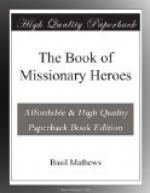Mackay had won the first battle against slavery. His heart was very glad. Yet he knew that, although he had scored a triumph in this fight with the slave-dealer, he had not won in his great campaign. The King was generally kind to Mackay, for he was proud to have so clever a white man in his country. But he could not make up his mind to become a Christian. M’tesa’s heart had not really changed. His slave-raiding of other tribes might still go on. The horrible butcherings of his people to turn away the dreaded anger of the gods would continue. Mackay felt he must press on with his work. He was slowly opening a road through the jungle of cruelty and the marshes of dread of the gods that made the life of the Baganda people dark and dreadful.
All Uganda waited breathless one day as though the end of the world had come.
“King M’tesa is dead!” the cry went out through all the land.
The people waited in dread and on tiptoe of eagerness till the new king was selected by the chiefs from the sons of the dead ruler.
At last a great cheer went up from the Palace. “M’wanga has eaten Uganda!” they shouted.
By this the people meant that M’wanga, a young son of M’tesa—only eighteen years old—had been made King. He was, however, a boy with no power—the mere feeble tool of the Katikiro (the Prime Minister) and of Mujasi, the Captain of the King’s own bodyguard of soldiers. Both of these great men of the kingdom fiercely hated Mackay, for they were jealous of his power over the old King. So they whispered into the young M’wanga’s ears stories like this: “You know that men say that Uganda will be eaten up by an enemy from the lands of the rising sun. Mackay and the other white men are making ready to bring thousands of white soldiers into your land to ‘eat it up’ and to kill you.”
So M’wanga began to refuse to speak to Mackay. Then, because the King was afraid to attack him, he began to lay plots against the boys.
One morning Mackay started out from his house with five or six boys and the crew of his boat to march down to the lake. Among the boys were young Lugalama—the fair-haired slave-boy, now a freed-slave and a servant to Mackay—and Kakumba, who had (you remember) been baptised Joseph. The King and the Katikiro had given Mackay permission to go down to the lake and sail across it to take letters to a place called Msalala from which the carriers would bear them down to the coast.
Down the hill the party walked, the crew carrying the baggage and the oars on their heads. Mackay and his colleague Ashe, who had come out from England to work with him, walked behind.
To their surprise there came running down the path behind them and past them a company of soldiers.
“Where are you going?” asked Mackay of one of the soldiers.
“Mujasi, the Captain of the Bodyguard,” he replied, “has sent us to capture some of the King’s wives who have run away.”




